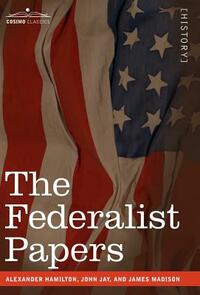You need to sign in or sign up before continuing.
Take a photo of a barcode or cover
hopeful
informative
inspiring
reflective
slow-paced
I read this through the Kindle app for free.
I am not a history person, but I decided I should try reading this, especially since it was readily available. I don't have the requisite knowledge about the context to really understand this, but I appreciated the different arguments put forth by Hamilton, Madison, and Jay.
I went into this really knowing nothing about when they were written or for what reason. Of course, it is very easy to pick up on quickly. It made me very grateful that such intelligent and thoughtful people were involved with the organization of the young United States. I guess I never gave much thought about how the US government came to be.
It was interesting to me to see the rivalry that some of the founding fathers felt towards Europe showing through--a reference to Jefferson's desire to prove American animals were larger than European.
I am not a history person, but I decided I should try reading this, especially since it was readily available. I don't have the requisite knowledge about the context to really understand this, but I appreciated the different arguments put forth by Hamilton, Madison, and Jay.
I went into this really knowing nothing about when they were written or for what reason. Of course, it is very easy to pick up on quickly. It made me very grateful that such intelligent and thoughtful people were involved with the organization of the young United States. I guess I never gave much thought about how the US government came to be.
It was interesting to me to see the rivalry that some of the founding fathers felt towards Europe showing through--a reference to Jefferson's desire to prove American animals were larger than European.
The fact that this collection is so deeply hallowed exemplifies the very problem with it. Because Hamilton, Madison, and Jay were writing to defend a Constitution which had not yet been ratified; and because, from our current-day perspective, the Constitution is regarded as a sacred text; there is, therefore, a blindness to the glaring defects in both documents. Those who reflexively defend the sanctity of the Constitution on the grounds that it's the best such document -- the best such model for government -- ever produced, choose to deny that it could possibly contain flaws. And this awe-filled reverence extends to "The Federalist Papers," despite the fact that even its authors repeatedly describe the Constitution as imperfect, and despite the fact that thousands of emendations have been proposed to our Constitution, and 27 of those have been ratified.
However, on a more fundamental level, the Constitution -- and, by extension, "The Federalist Papers" -- can be seen as defeatist documents. This is to say that once it had been cobbled together, the Constitution was, and still is, considered inviolable and irreplaceable. In other words, once it had been agreed that our form of government is the best ever instituted, the search for better forms largely ceased (at least within our sphere of influence). I'm not suggesting here that monarchies, communist states, or what have you, are superior to the republic established by the Constitution. I'm simply saying that once you stop looking, you find nothing further. Imagine, for example, if human beings had, after inventing mud huts, decided that since shelter was now provided for, there was no need to focus any further attention on the matter. The Constitution, "The Federalist Papers," and our form of government are sort of like the mud hut of societies.
How could I say such a thing? Because by following the principles of the Constitution, we have created an omnivorous capitalist machinery which is not simply unsustainable, but is leading to total societal collapse, perhaps within the lifetimes of those reading these words. If we accept that as fact, can we really say that our system is so wonderful?
Our nation is toxic now because it started out that way. Consider the foundation upon which this system was built up. It began with wholesale dehumanization, and ultimate genocide, of the pre-existing inhabitants of these lands. The wealth of our nation was almost exclusively built through the lives and labor of the enslaved. The "noble" Constitution which Hamilton and his friends were defending so vociferously and voluminously, while speaking highly of "the people," really meant rich, white, male landowners. Even if we are to ignore the fact that Madison and Jay are known to have been enslavers, and that recent evidence is making a case for Hamilton on that count, the very language of this book argues that they viewed the United States as an establishment which was intended to benefit the privileged. Consider a sentence such as: "There is an excess of refinement in the idea of disabling the people to continue in office men who had entitled themselves, in their opinion, to approbation and confidence, the advantages of which are at best speculative and equivocal, and are overbalanced by disadvantages far more certain and decisive." This convoluted statement could easily be paraphrased, with no loss in meaning as: "There's no need to prohibit voters from re-electing men they once though were good for the job after they've proven themselves to be bad for the job." But stating it in such simple language would have made it comprehensible to a much wider audience. And "The Federalist Papers" is wall-to-wall with such rococo word salads. It is obvious that the authors of "The Federalist Papers" were writing to and for the most privileged members of society, and this falls in line with the general tenor and intent of the Constitution itself.
Add to this the sheer hubris and sort-sightedness of the authors. Hamilton goes out of his way, toward the end of this volume, to argue against any need for a Bill of Rights. And yet, in less than five years the first ten Amendments were ratified. Likewise, Hamilton's objections to term limits on judges have proved to be naive in the extreme, as we now have a Supreme Court which, largely thanks to gerrymandering and a two-party system increasingly entrenched in partisanship, becomes ever more politicized as time goes by. And there are literally dozens of comparable examples strewn throughout the text. It could be argued that it was impossible for the authors, living in the 1780s, to predict developments 250 years into the future. But it could equally well be argued that they damn well could have and should have. In short, the argument that ours is the greatest nation in the history of the world, and that this is largely due to our Constitution, is a bit like saying that a lump of dog shit found on the sidewalk is the best one in the history of the world, and that this is largely due to its consistency.
As the unrest in our own country, as well as the instability we have had a direct hand in causing throughout both the natural and man-made world clearly illustrate, we need to do better, or else perish as a result of our own stubborn pride. "The Federalist Papers" is a study in precisely that pathology.
However, on a more fundamental level, the Constitution -- and, by extension, "The Federalist Papers" -- can be seen as defeatist documents. This is to say that once it had been cobbled together, the Constitution was, and still is, considered inviolable and irreplaceable. In other words, once it had been agreed that our form of government is the best ever instituted, the search for better forms largely ceased (at least within our sphere of influence). I'm not suggesting here that monarchies, communist states, or what have you, are superior to the republic established by the Constitution. I'm simply saying that once you stop looking, you find nothing further. Imagine, for example, if human beings had, after inventing mud huts, decided that since shelter was now provided for, there was no need to focus any further attention on the matter. The Constitution, "The Federalist Papers," and our form of government are sort of like the mud hut of societies.
How could I say such a thing? Because by following the principles of the Constitution, we have created an omnivorous capitalist machinery which is not simply unsustainable, but is leading to total societal collapse, perhaps within the lifetimes of those reading these words. If we accept that as fact, can we really say that our system is so wonderful?
Our nation is toxic now because it started out that way. Consider the foundation upon which this system was built up. It began with wholesale dehumanization, and ultimate genocide, of the pre-existing inhabitants of these lands. The wealth of our nation was almost exclusively built through the lives and labor of the enslaved. The "noble" Constitution which Hamilton and his friends were defending so vociferously and voluminously, while speaking highly of "the people," really meant rich, white, male landowners. Even if we are to ignore the fact that Madison and Jay are known to have been enslavers, and that recent evidence is making a case for Hamilton on that count, the very language of this book argues that they viewed the United States as an establishment which was intended to benefit the privileged. Consider a sentence such as: "There is an excess of refinement in the idea of disabling the people to continue in office men who had entitled themselves, in their opinion, to approbation and confidence, the advantages of which are at best speculative and equivocal, and are overbalanced by disadvantages far more certain and decisive." This convoluted statement could easily be paraphrased, with no loss in meaning as: "There's no need to prohibit voters from re-electing men they once though were good for the job after they've proven themselves to be bad for the job." But stating it in such simple language would have made it comprehensible to a much wider audience. And "The Federalist Papers" is wall-to-wall with such rococo word salads. It is obvious that the authors of "The Federalist Papers" were writing to and for the most privileged members of society, and this falls in line with the general tenor and intent of the Constitution itself.
Add to this the sheer hubris and sort-sightedness of the authors. Hamilton goes out of his way, toward the end of this volume, to argue against any need for a Bill of Rights. And yet, in less than five years the first ten Amendments were ratified. Likewise, Hamilton's objections to term limits on judges have proved to be naive in the extreme, as we now have a Supreme Court which, largely thanks to gerrymandering and a two-party system increasingly entrenched in partisanship, becomes ever more politicized as time goes by. And there are literally dozens of comparable examples strewn throughout the text. It could be argued that it was impossible for the authors, living in the 1780s, to predict developments 250 years into the future. But it could equally well be argued that they damn well could have and should have. In short, the argument that ours is the greatest nation in the history of the world, and that this is largely due to our Constitution, is a bit like saying that a lump of dog shit found on the sidewalk is the best one in the history of the world, and that this is largely due to its consistency.
As the unrest in our own country, as well as the instability we have had a direct hand in causing throughout both the natural and man-made world clearly illustrate, we need to do better, or else perish as a result of our own stubborn pride. "The Federalist Papers" is a study in precisely that pathology.
"Why has government been instituted at all? Because the passions of men will not conform to the dictates of reason and justice, without constraint. "
I think this is one of those pieces of history and literature that I more wanted to HAVE read than wanted to actually do the reading of... There's a lot of nonfiction like that where I'd just like to be able to download the knowledge/content, not actually wade through the writing. This had a lot of highs and lows for me. Also, since I was reading in ebook format, I started out expecting it to be about half as long as it actually is (note to self: the longer the book, the less likely I'm going to enjoy reading it in electronic format).
Hamilton's writing dominates this collection of 85 essays. I generally enjoyed his basic refutation of the main arguments against the creation of a United States under a republican government via the adoption of the Constitution (a much shorter read: https://www.archives.gov/founding-docs/constitution). You get a thorough appreciation for how much thought and consideration went into the founding of the U.S. government in attempts to learn from history and take the best (and most practical) parts of past and foreign government concepts/structures. I took enough notes and highlighted enough passages to create my own auxiliary book, but I'll simply leave you with a positive quote as we move into the 2024 election season...
"Hearken not to the unnatural voice which tells you that the people of America, knit together as they are by so many cords of affection, can no longer live together as members of the same family; can no longer continue the mutual guardians of their mutual happiness; can no longer be fellow citizens of one great, respectable, and flourishing empire."
-------------------------------
My knowledge of history is woefully lacking. On the bright side, this leaves a lot of room for more reading...
-------------------------------
~1776 WORDS/PHRASES I NEED TO LOOK UP
nugatory | demesnes | Amphictyonic | diet (German political body) | contumacious | stadtholder | Belgic | monitory | Treaty of Westphalia | mulcts | animadversion | junto | parsimony | odium | posse comitatus | ignis fatuus | desideratum | opprobrium | celerity | encomiums | chancery | lex loci | superannuated | peculation | prorogue | seraglio | janizaries | plenipotentiary | cavilling | primeval | extirpated | palladium | apothegm | defalcations
(basically, if I see a word I can't readily define easily in my head, I consider it a word I don't "really" know; the sad thing is that many of these words, I have looked up in the past and still don't seem to retain the definition... )
Still working my way through this, it’s a 2012 resolution of mine. I’ve read at least the first ¼. Its really very fascinating.
I didn't think this would have any modern relevance, but the famous Federalist 10 speaks about the risk of being so focused on your own cause or political party that you prevent any progress being made on shared problems just to spite those who aren't like you.
informative
reflective
slow-paced
I read this because I am reading a biography of all the Presidents in order, and I felt like this fit well into my reading list.
The Federalist Papers were not so much an enjoyable read as an informative read. I found the arguments for the constitution very interesting though at times it was a struggle to get through. I am glad I did get through it.
The Federalist Papers were not so much an enjoyable read as an informative read. I found the arguments for the constitution very interesting though at times it was a struggle to get through. I am glad I did get through it.
informative
reflective
slow-paced
Graphic: Racial slurs
Significant but dull
It was my mistake to choose reading a full collection of papers. Though the book contains good and well written passages, generally it is full of platitudes and trivial rhetoric. This is justified by the purpose, they wrote for; today it has only the value of immersion in the historic moment and political process of the day.
It was my mistake to choose reading a full collection of papers. Though the book contains good and well written passages, generally it is full of platitudes and trivial rhetoric. This is justified by the purpose, they wrote for; today it has only the value of immersion in the historic moment and political process of the day.




